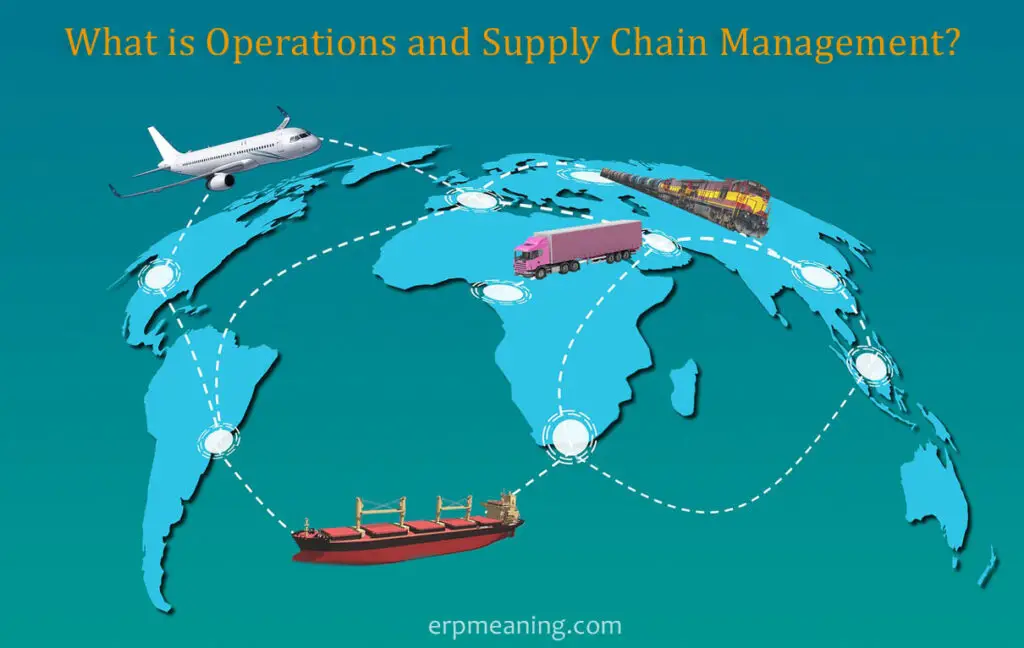
Operations and Supply Chain Management are distinct but related functions of supply chains. These procedures are critical to a company’s success since they provide the foundation for product delivery.
Product distribution is a long and laborious procedure, which includes numerous internal and external operations and personnel throughout the route. Managers of all levels are involved in the various elements of the process, including operations and supply chain management.
Even though the procedures and responsibilities may be similar, they are entirely different. Businesses must figure out how to use these two areas to add value and efficiency, increasing profits. In this post, we’ll look at the differences and similarities between operations and supply chain management, as well as how to determine which is best for you.
What is Operations Management?
Operations managers oversee day-to-day operations for a whole business or a specific production line area, depending upon the company’s size. The division of Production and Operations is more internal when compared to Supply Chain. Managers in this area make basic design, production, planning, workflow, and personnel decisions.
In other words, operations managers handle internal company procedures rather than product or service delivery. This generally necessitates professionals who are knowledgeable in developing rapport with corporate stakeholders, up to date on current technology solutions, and agile at analysis. Managers who deal with operations should also be aware of recent trends in operations management to help cut waste and boost productivity.
These experts predict sales, work to enhance customer service, and make sure that consumer requirements are met, among other things.
Operations Management Roles
- Developing strategies to ensure materials are available in the right quantities at the correct times.
- Ensuring good communication between teams involved in supply (such as procurement, logistics, warehousing).
- Organizing production processes. This might include setting up systems that can be scaled up or down to meet demand fluctuations.
- Overseeing the quality of products and ensuring they meet customer specifications.
- Developing policies and procedures for efficient operations, such as safety policies, waste reduction plans, HR procedures, etc.
- Optimizing processes to reduce costs while maintaining quality.
- Ensuring that products are delivered on time and to the correct location.
- Monitoring performance of the supply chain and making changes where necessary. This might include introducing new technology or changing supplier relationships.
Key Benefits of Operations Management
Improved Product Quality
The operations management unit in a typical firm checks product durability and reliability. Operations management ensures the quality of products on and after delivery. A quality product gives you an edge over your competitors.
Improved Productivity
The only way to measure employee productivity is by comparing the input to output. Operation management allocates employees to resources to achieve maximum results. Only effective operations management can ensure productivity.
Improved Customer Satisfaction
Managers and employees have no feeling like a customer receiving the utmost satisfaction. Operational management makes sure of this. Customers make organizations thrive, and they must be treated well in all ways.
Reduced Operating Cost
Products servicing costs are minimized by producing quality products, providing customer satisfaction, and improving productivity. As a result, revenue increases. Only operations management can achieve this. Lower operating costs lead to a reduction in waste. Proper operations management ensures that the exact number/size of products is produced as requested.
What is Supply Chain Management?
Supply chain management (SCM) is the strategic oversight of the movement and storage of materials and goods. SCM includes managing the flow of products from suppliers to manufacturers and retailers, and consumers. This encompasses everything from ensuring adequate supply, production planning, and execution to delivery and after-sales service. In the supply chain process, the supply chain manager is responsible for communicating with the other key players, such as suppliers, logistics teams, and clients. They may work across borders, manage suppliers, warehouses, purchasing orders, and forecasting.
Supply chain management aims to create an efficient system that progresses raw materials into finished products on time and with the appropriate specifications. Supply managers of all levels need to be involved in this process since they’re responsible for moving and storing goods and ensuring enough supplies at each stage along the supply chain.
Supply chain management is essential for enterprises since it can help them cut costs by lowering inventory sizes and suppliers, offering superior services with faster delivery, and responding quickly to market developments and demands. This area gives corporate responsibility in all phases of manufacturing.
Supply Chain Management Roles
- Forecasting demand for goods and materials to be supplied to other departments and logistics teams.
- Examining supply or demand problems, such as excess inventory of a particular item across the supply chain.
- Developing strategies for increasing product availability and reducing costs. This might include outsourcing tasks that aren’t core competencies to companies specializing in those areas (logistics, warehousing).
- Identifying supply chain problems, such as supply or demand imbalances.
- Acting quickly to solve supply chain shortages and disruptions.
- Keeping track of inventory flow throughout the supply chain. This may include everything from raw materials to finished products shipped out to consumers.
- Ensuring there is clear communication between all players in the supply process.
Key Benefits of Supply Chain Management
Decreased Costs
The practice of supply chain management involves optimizing a company’s supply chain to reduce its costs. Businesses can lower their expenses by streamlining their operations, reducing waste, and increasing efficiency through improved coordination and communication among supply chain partners. This implies that everyone involved in the supply chain saves money, from manufacturers to customers.
Better Collaboration
Another benefit of a supply chain is that it assists all the business entities to deliver the final product to the customer. You have no idea what happens when vendors or distributors are not communicating. You can access real-time forecasts, reporting, quotes, and statuses when you embrace supply chain systems.
Increased Output
When your business can collaborate better and streamline the production and distribution process, the company’s overall output improves. You can therefore enjoy greater profits and stay ahead of the competition.
Timely delivery
On-time delivery and meeting customer expectations are possible. Having everyone know what to do at a given time will prevent bottlenecks on production lines, problems with distribution channels, and delays in shipments from suppliers. Overall, there will be no delay in getting the products to the consumers.
Improved risk mitigation
Companies can put backup plans in place in unexpected circumstances by analyzing comprehensive and granular supply chain data. A proactive approach can avoid negative impacts such as disruptions in supply chains, quality control issues, and other concerns. Companies can also become leaner by understanding risks.

Operations and Supply Chain Management: Differences
There are some critical differences between operations and supply chain management, which will impact the way they work. The following list summarizes their different focuses:
- Operations Management is concerned with managing operations or processes, whereas Supply Chain Management manages supply activities, including goods and services.
- Operations management focuses on events within the organization or company. The task of supply chain management, on the other hand, includes activities external to the workplace, such as delivering items when and where they’re needed.
- Operations Management is responsible for ensuring that products meet customer specifications, while Supply Chain Management is concerned with procuring materials and ensuring they are available when needed.
- Operations management is responsible for the production process. Supply Chain Management manages the supply or transport of goods from one place to another.
- Most of the time spent on Operations management is devoted to planning, managing, and organizing daily operations or activities. Most of the time spent in supply chain management is focused on evaluating suppliers, which includes qualitative and quantitative assessment and contract negotiation.
- Operations management involves planning, organizing, and overseeing operations to improve. The supply chain management process requires planning, preparing, executing, controlling, and monitoring supply chain activities.
- Operations management has a variety of benefits. These include an improved revenue stream, motivated workers, better customer satisfaction, and higher product quality. Supply Chain Management can help you minimize overhead expenditures, improve cash flow, enhance risk mitigation, and improve quality control.
- The goal of Operations Management is to use the resources of an organization to create items or services, increase client satisfaction, and deliver products or services of good quality on time. Supply Chain Management’s objectives are to maximize the overall value created by the company, improve organizational performance, and manage inventory effectively, among others.
Final Note
In any organization, supply chain management plays a vital role. Without it, the company would not provide goods and services efficiently or cost-effectively. Operations managers work within this supply chain process to ensure that what you purchase from your business comes in an orderly manner with no delays along the way. A successful supply chain needs both operations and supply chain management for success.
